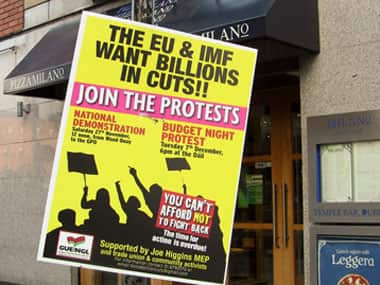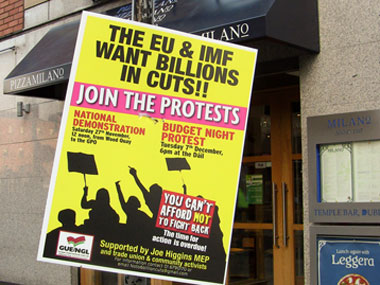When the European Union was born as a geographical unit across political borders but with a single currency, it was romanticised as a realisation of John Lennon’s ‘ Imagine there’s no country ’ dream.
But today, that project is at serious risk of coming apart in disorderly fashion - with enormous consequences for the global economy.
“Europe is facing its version of the Final Countdown,” observes Societe Generale analyst Fidelio Tata.
Financial historian and Harvard University professor Niall Fergusson puts it even more bluntly. He told Bloomberg television :
“The tensions within Europe… are making me nervous. Europeans don’t seem to get their act together.” And the danger of that, he warns chillingly, “is that we will have a 2008-style event in Europe.”
That 2008 “event” of course refers to the financial meltdown on Wall Street, with its roots in the subprime mortgage crisis, which had a contagion effect in economies and markets around the world, from which they are yet to fully recover.
Which explains why global equity markets have been on a downward spiral in recent days. All the signs are that the sovereign debt crisis in the peripheral PIIGS - most severely in Greece - is beginning to spread and drag down economic growth even in the core of Europe. The peripheral PIIGS are Portugal, Ireland, Italy, Greece, and Spain, all of which have unsustainable debts. The core countries are Germany and France.
John Wraith, fixed income strategist at BofA Merrill Lynch, said, “It is like a group of climbers roped together. As Greece slips, it pulls down other countries such as Spain and Italy.” (From the Financial Times )
Impact Shorts
More ShortsIn recent days, there’s been a rash of bad news going beyond the peripheral states: Belgium’s sovereign rating was downgraded by Fitch. Italy was put on probation and a sovereign watch.Rating agency Standard & Poor’s said the negative outlook on Italy “implies a one-in-three chance that the ratings could be lowered within the next 24 months.”
“But that,” it added, “is just a statistic. In reality, the risk is far greater.”
Worse, in Europe’s moment of crisis, its leaders and policymakers are openly squabbling over ways to deal with the crisis, now that it’s been empirically established that successive rounds of bailouts haven’t put out or localised the fire.
For all the teary-eyed emotion that the prospect of European continental unity gave rise to, it was always a political project that lacked the economic structures to make it work: things like a common fiscal system, wage and price flexibility and labour mobility.
[caption id=“attachment_14653” align=“alignleft” width=“380” caption=“Leaving the Eurozone is not without risks or costs, but that price is anyway being paid today. Photo by William Murphy”]
 [/caption]
[/caption]
But today, euphoria over that integration has run its course. Instead, there is only fatigue from both ends: the stronger-growing core economies no longer want to throw good money after bad in bailing out the peripheral PIIGS; and the peripheral players, which don’t have much to show for the bailouts they’ve received so far, seem far more inclined to leave the union - and the rigidities it imposes on fiscal policy.Leaving the Eurozone is not without risks or costs, but that price is anyway being paid today.
Of course, there’s also the possibility that unwilling to accept the prospect of a break-up, politicians and policymakers could go the other way - in favour of a fiscal union and greater political integration.
But that, as UBS analysts point out, is also fraught with risk. While it could “make it easier to manage the debt crisis in the short term, we see a risk of weakening Europe’s economic strength in the long run. Disputes over redistribution would be inevitable in this scenario, which in the long term could jeopardise not only the euro but also the very process of European unification itself.”
Which is why a reconfiguration of the European Union to allow for some countries to leave the flawed monetary union is inevitable. If that happens, what’s left of the union could actually emerge stronger from the ruins. Sure, a few tears will be shed for the loss of a John Lennon-esque dream, but it’s more expedient -politically and economically - than sticking with a flawed integrationist idea whose time is up.
Venky Vembu attained his first Fifteen Minutes of Fame in 1984, on the threshold of his career, when paparazzi pictures of him with Maneka Gandhi were splashed in the world media under the mischievous tag ‘International Affairs’. But that’s a story he’s saving up for his memoirs… Over 25 years, Venky worked in The Indian Express, Frontline newsmagazine, Outlook Money and DNA, before joining FirstPost ahead of its launch. Additionally, he has been published, at various times, in, among other publications, The Times of India, Hindustan Times, Outlook, and Outlook Traveller.
)